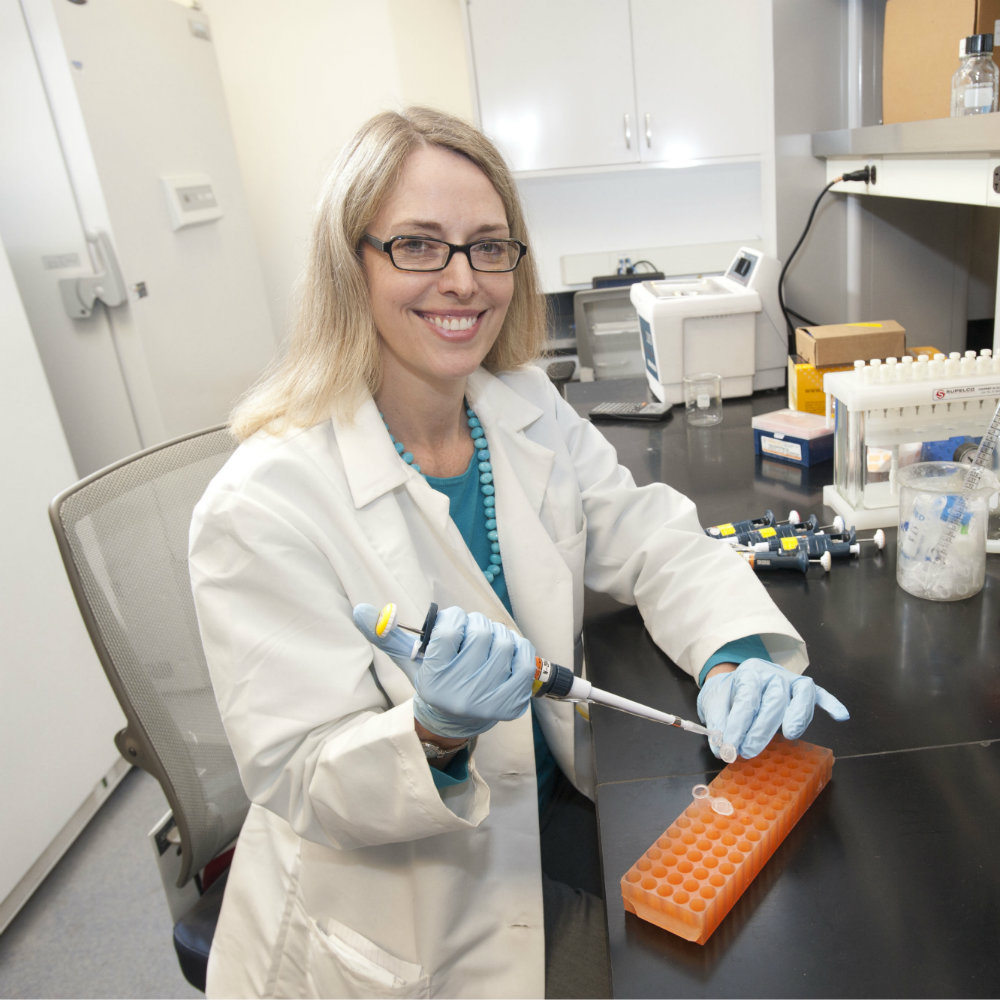
In the weeks and months after a patient gets a heart stent, blood clots can pose a major threat to recovery. Now, University of Florida Health researchers have found that a quick genetic test can tell doctors early on whether a crucial anti-clotting drug will work, they reported today (Nov. 9) at the American Heart Association’s Scientific Sessions in Orlando.
They also are hailing the finding as a significant gain for personalized medicine, which tailors medical decisions based on individual patients’ genetic information and other unique characteristics.
Their research focused on clopidogrel, a drug that can prevent blood clots after a heart artery is propped open with a coronary stent. Yet the drug doesn’t work on everyone: About 30 percent of all patients have a genetic deficiency that prevents them from activating it. Treating those patients with a drug their bodies can’t use is akin to providing no medication, said associate professor Larisa Cavallari, Pharm.D., director of the Center for Pharmacogenomics at the UF College of Pharmacy and associate director of the UF Health Personalized Medicine Program.
That’s where the genetic testing made available through UF Health Pathology Laboratories and studied by UF Health researchers comes into play.
A patient’s genetic information is analyzed quickly and economically using a process known as genotyping. That tells a physician if clopidogrel will work effectively, allowing doctors to more precisely personalize treatment by prescribing a different medication. The genotyping also has lifesaving implications: Every patient gets the best possible drug at the right time, Cavallari said.
“This is tailoring therapy based on the patient’s genetic makeup, and recognizing that not everyone is going to respond well to one drug,” she said.
The study is among the first to examine the effect of genotype-guided treatment on cardiovascular outcomes after a heart procedure known as percutaneous coronary intervention, or PCI, researchers said.
During the two-year study, researchers tracked 408 patients who had genotyping and had a PCI to open narrow or clogged heart arteries. Of that group, 126 patients had the genetic deficiency that prevents clopidogrel from working effectively. Fifty-eight of them were treated with clopidogrel and 68 received an alternative medication.
After six months, the risk of major cardiovascular problems such as death, heart attack, stroke and having a stent become blocked by blood clots was significantly reduced among patients with the genetic deficiency who were prescribed an alternative drug, researchers found. None of those patients had a major cardiovascular problem within 30 days of the PCI procedure. In contrast, 12.5 percent of patients who got clopidogrel but could not activate it had problems such as a heart attack or blood clot.
That shows exactly how genetic analysis can be used for a more effective and personalized health care experience, said Julie A. Johnson, Pharm. D., dean of the UF College of Pharmacy, the project’s principal investigator and the director of the UF Health Personalized Medicine Program.
“This is a way to identify a medication that isn’t going to be very good for some patients and choose an alternative that’s better for them,” she said.
In addition to saving lives and preventing medical problems, genotyping has significant implications for the business side of health care. Simple genotyping that costs several hundred dollars can prevent a heart attack by getting a patient on the correct antiplatelet medication early on.
“You don’t have to prevent a lot of heart attacks to achieve a cost savings,” Johnson said.
The Personalized Medicine Program is expanding genotype-guided therapy at UF Health to include additional medications for which genetic variations are known to influence effectiveness. Genotyping patients to determine the best drug dose or the most effective medication can also be used for other diseases such as hepatitis C, some pediatric cancers, inflammatory bowel disease and pain management, Johnson said.
Personalized medicine, also known as precision medicine, is already delivering benefits for PCI patients at UF Health Shands Hospital because genotyping is standard practice for most of these patients, Cavallari said.
Next, researchers want to make cardiologists and other health systems aware of the benefits of genotyping PCI patients. No randomized, controlled trial with PCI patients has been done and Cavallari doesn’t believe it is necessary.
“We believe the current data are strong enough to support using genotyping in a clinical setting. It provides data to support the idea that other health care institutions should do this,” she said.
The Personalized Medicine Program is collaborating with other institutions to study outcomes of genotype-guided anti-clotting therapy in a larger group of PCI patients. To help spur broader adoption, the UF Health team also is evaluating education and implementation strategies so others can build on the program’s experience.
UF Health’s Personalized Medicine Program is a multidisciplinary initiative created in 2011 within the Clinical and Translational Science Institute. Led by College of Pharmacy faculty, researchers work with health professionals and patients at UF Health and across the state to study and implement methods that allow genetic information to be used as a routine part of patient care.
Funding and other support for the PCI research was provided by UF Health, its Clinical and Translational Science Institute and National Institutes of Health grants U01 HG007269, U01 GM074492, U01 HL105198 and UL1 TR000064.